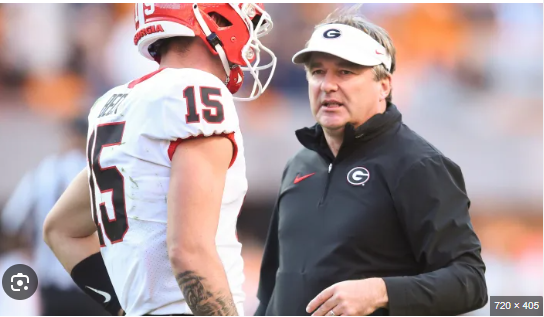
Earl Ehrhart says he only encountered Kirby Smart once, in March 2016, before Smart had coached a football game at Georgia. Perhaps then it should have been obvious the signs were already there that this Georgia football coach would play defense better than any Bulldogs coach before him.
At the time, Ehrhart was the longest-tenured Republican in the Georgia House of Representatives. Smart had visited the capitol with university athletics department officials and been asked the differences between Georgia and other programs he was at previously. His answer convinced Ehrhart to introduce an 11th-hour amendment that changed the state’s open-records laws to conform with others in the SEC, most notably Alabama – where Smart had just worked under Nick Saban for nine seasons.
Smart was strategic and calculated, “from the very beginning” of his tenure, said former Georgia athletics director Greg McGarity, who was in the room. This particular meeting wound up providing Georgia’s athletics department and other public colleges in the state up to 90 business days to respond to open-records requests instead of three days.
Smart, when asked at the time, did not elaborate on how the amendment would help Georgia’s football program. Ehrhart said it was meant to protect the identities of prospects the Bulldogs were recruiting. McGarity said it helped his overwhelmed staff, which handled open records requests made to the athletics department.
“I hope it brings us a national championship,” then-Lieutenant Gov. Casey Cagle declared on the House floor. Several media reports declared it “Kirby’s Law.” Smart bristled at the nickname, calling it “ridiculous.”
Smart “talked about that competitive advantage. It wasn’t about a lack of transparency. It was a competitive disadvantage across the board against all the other SEC schools,” Ehrhart recalled to USA TODAY Sports last month.
Eight years and two national titles later, the notion of Georgia taking a backseat to anybody in college football is almost laughable. Few operate quite like Smart and Georgia right now, with Alabama about the only team consistently standing in the Bulldogs’ way anymore.
Smart has moved into Saban’s spot as the highest-paid college football coach in the country this year, according to USA TODAY Sports’ annual analysis of coaches’ compensation released Wednesday. He is the first coach to earn more than $13 million in annual pay from a school after Georgia announced in May that it had extended his contract through 2033. It is about $2.5 million more than Smart made from the school in 2023 and is about $2 million more than what Clemson’s Dabo Swinney is set to make as the second-highest paid coach in the country (just over $11 million). It is the largest gap between the nation’s two highest-paid coaches in terms of recurring annual compensation since USA TODAY Sports began its salary database in 2006.
The new contract was a reward for all the wins, and all the revenue generated, during a run Georgia president Jere Morehead called “the definition of excellence for all of college football,” in a statement announcing the deal.
Smart’s compensation now dwarfs that of Kansas’ Bill Self and Arkansas’ John Calipari, who are the highest-paid men’s basketball coaches in the country at $8.65 million and $8 million from their respective schools for the upcoming season. Smart would rank among the top 15 highest-paid CEOs in the state of Georgia, according to AFL-CIO figures from 2023. There were only six coaches in American professional sports in 2023 earning more than Smart will this season, Sportico reported last year.
But the optics — and rationale — have been complicated by a rash of traffic-related incidents of varying significance involving Georgia football players that continued into this season; recent graduation rates that are among the worst in the country; and the underlying question of what responsibility lies with a man who’s likely now the highest-paid public employee in the country.
Kirby Smart and ‘the cost of leadership’ at Georgia
Smart has spoken about “the costs of leadership” before, and he mentioned the concept again when answering questions about the arrest of another Bulldogs football player earlier this month.
Junior wide receiver Colbie Young had been charged with battery and assault of an unborn child on Oct. 8 following an alleged altercation with Young’s ex-girlfriend at his apartment. Smart announced the next day that Young would be indefinitely suspended until the legal matter was resolved. It came just two months after Smart dismissed wide receiver Rodarius “Rara” Thomas from the team after a second arrest for charges involving family violence.
Smart referred to potential domestic violence situations as, “the hardest thing you deal with when you deal with players and some of the decisions.” But eventually it seemed as if he wasn’t speaking about just one type of incident.
“When you have 130 17- to 23-year-olds, that’s, you’re going to have issues. It’s not going to be perfect and I certainly recognize we’ve got to do a better job,” Smart said. “But it’s hard, it’s hard on our staff, because we got really good kids. We got really good people, man.
“You just want them to make better decisions as men off the field, and I take a lot of responsibility in that,” he continued. “It’s tough, but that’s the cost of leadership. You’re going to be judged by the people you lead, and you got to stand up and face it, and do right by the kids and keep trying to find a better way.
Leave a Reply